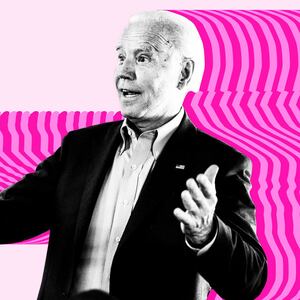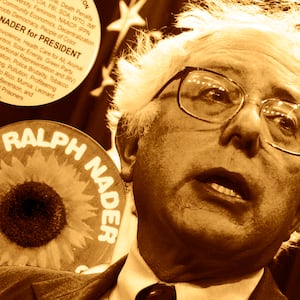With over four decades in public office, two terms as vice president, and his only rival out of the presidential race, Joe Biden has become the leader of the Democratic Party.
And now the work truly begins.
Interviews with 15 Democratic advisers and allies of Biden and Sen. Bernie Sanders (I-VT), sitting members of Congress and Hill aides, Democratic National Committee members, activists, and outside party operatives revealed a clear-eyed look at what the new standard-bearer needs to do in the coming weeks to make sure the ultimate goal, defeating President Trump, happens as planned.
The majority of Democratic sources who spoke to The Daily Beast about Biden’s next moves said he needs to begin an immediate charm offensive to court Sanders’ endorsement and win over the millions of progressives who backed his former opponent’s primary bid, which ended on Wednesday. With Americans cooped up under strict stay-at-home guidance during the coronavirus pandemic, Biden, who is also self-isolating in his Wilmington, Delaware home, has plenty of time to start making those calls.
“There’s a Hebrew word called covet,” Ed Rendell, a top Biden lieutenant and former Democratic National Committee chairman, said on the eve of Passover about reaching out to Sanders’ allies. “You’re showing them respect for who they are and what they’ve done.”
Showing respect, some Sanders supporters say, will also entail giving the senator and his backers a moment to grieve—and a moment in the sun—as a hard-fought primary that’s lasted over a year approaches an end. But quiet outreach from the Biden campaign has already begun, with a steady investment in building relationships with staff of those who are close to the Vermont senator, including high-profile campaign surrogates.
And against the backdrop of the deepening crisis caused by the coronavirus outbreak, Biden has also been laying the groundwork to position his organization as a party leader. In recent weeks, the former vice president—whose prior communication with possible backers on the Hill had been spotty at times—has stepped up his outreach to supporters in Congress.
The Biden campaign has held conference calls with Democratic lawmakers and their staffs to discuss how the campaign and the candidate are approaching the crisis and to offer a venue for sharing questions and advice. The most recent one was on Monday.
“Everything about Vice President Biden tells me he’s going to be very conciliatory and very respectful. This is kind of his skillset,” Democratic campaign veteran James Carville said. “I think you do it by acknowledging that he’s made invaluable contribution to the political debate in America.”
Top Biden endorsers and advisers are now cautiously envisioning—and actively promoting—a dynamic which, just several weeks ago, seemed improbable: a smooth process to unite a fractured party against Trump.
“Joe Biden is going to beat Donald Trump in November because Democrats are united in the direction we want to take the country and in our belief that Trump must be defeated,” Rep. Seth Moulton (D-MA) said. “Sometimes we disagree about how to get there. But I am confident that Democrats are going to unite around the fact that Joe Biden has a record of getting things done on the big issues we care about—equality, opportunity, and progressive values.”
Unlike in 2016, when Sanders stayed in the race against Hillary Clinton longer than some anticipated or desired, the majority of Democrats interviewed expressed feeling relieved, even grateful, for his decision to drop out of the presidential campaign on Wednesday afternoon after citing unfavorable delegate math.
“I think the folks who were there in the first campaign and the second campaign have much more of a sense of legacy, of wanting to end this campaign in a good historical place,” a Democrat familiar with Sanders’ thinking said.
The nature of Biden and Sanders’ relationship, which sources close to both politicians widely regard as a genuine friendship with mutual admiration for their respective work in the Senate, is apt to make the courting process easier. That mutual respect was evident at several junctures of the campaign cycle, including during the debates, when Biden avoided hitting his former Senate colleague as hard as his rivals out of deference to their closeness.
“He and Sen. Sanders have a legitimately real relationship,” said Steve Schale, a longtime Biden adviser who now runs the super PAC supporting his bid, Unite the Country. “There’s a genuine fondness for each other.”
In a lengthy Medium post on Wednesday, which came just moments after Sanders announced over a livestream that he was indeed suspending his bid, Biden directly acknowledged that closeness, starting a paragraph of the note with “As friends...”
“I’ll be reaching out to you,” he wrote. “You will be heard by me. As you say: Not me, Us.
And to your supporters I make the same commitment: I see you, I hear you, and I understand the urgency of what it is we have to get done in this country. I hope you will join us. You are more than welcome. You’re needed.”
He made it clear again Wednesday night during a virtual town hall. From his basement television studio, Biden was quick to address one of the most pressing concerns of Sanders’ supporters: issues facing working people across the country.
“Bernie's always been a passionate voice for progress,” Biden started out his event. “He created a movement. And that's a good thing for the nation and our future,” he said. “I know his leadership is going to continue."
Those types of overt efforts, in addition to movements behind the scenes, Biden backers say are necessary to help win over the support of progressives who supported Sanders.
“I think this is going to be a normal negotiation,” said Rep. Tim Ryan (D-OH), who was one of Biden’s earliest congressional backers. “It will be some of Bernie’s key surrogates playing a key role in the Biden campaign and making sure that some of Bernie’s policies are adopted by the vice president.”
Over the past several weeks, Biden has adopted portions of Sanders’ platform, including a modified version of tuition-free college and student loan debt forgiveness. Sanders, meanwhile, argued again on Wednesday that he won the ideological debate, a favorite line meant to keep enthusiasm high.
“A majority of the American people now understand that we must raise the minimum wage to at least $15 an hour, that we must guarantee health care as a right,” he said during his livestream event announcing his departure from the race.
But not every Democrat is convinced Sanders won that fight outright. While some Biden allies conceded Sanders had a considerable hand in tilting the party’s likely platform in a more progressive direction, others gave the former vice president credit for championing many left-leaning policies during the Obama administration.
“I don’t think this is about making concessions on policy,” said Matt Bennett, co-founder of the centrist Democratic think tank Third Way. “The primary fight was a contest of ideas, and Biden’s won by a wide margin. He is under no obligation to change that now, and he shouldn’t. He has made some tweaks. Now he should simply continue to emphasize that Sanders and his supporters have a hugely important role to play in the general election, and he welcomes their input.”
A donor close to Biden added, “Of course you don’t want to make the same mistakes that Hillary did, you know, failing to extend the olive branch beyond a few courtesy concessions in the platform process.”
One notable element missing from Sanders’ announcement was an endorsement. And Sanders was also open about his bid to have as many delegates as possible behind him at the Democratic convention in August to use as leverage.
A significant public show of support for Biden from Sanders’ orbit could still be far off. Sanders’ most prominent endorsers are unlikely to throw their support behind Biden until Sanders himself does, Democrats familiar with the planning told The Daily Beast. According to one knowledgeable source, the Sanders campaign is encouraging its backers to not get ahead of the senator in supporting Biden’s candidacy—with the aim of ensuring the progressive priorities Sanders fought for are taken seriously for consideration by the Biden campaign. A spokesperson for the campaign did not return a request for comment.
One public showing of that came immediately following Sanders’ exit, when seven progressive organizations, including the Sunrise Movement, NextGen, and Justice Democrats penned an open letter to Biden urging him to adopt a more liberal platform. In one specific request, singers urged Biden to reject having any current or former Wall Street executives, corporate lobbyists, or people affiliated with the fossil fuel, health insurance, or private prison corporations on his transition team, in adviser roles, or in his cabinet.
“With young people poised to play a critical role deciding the next president, you need to have more young people enthusiastically supporting and campaigning with you to defeat Trump,” the letter read. “Exclusively anti-Trump messaging won’t be enough to lead any candidate to victory.”
Some Democrats in Sanders’ broader network echoed similar sentiments.
Megan Ellyia Green, a Democratic National Committee member from Missouri, said Biden's approach has left something to be desired. “If we're talking about issues, he still has not pivoted to really speak to the issues of people in my generation," said Green, who ultimately said she still plans to support the nominee.
Biden will also get Curtis Wylde's general election vote, but the professional wrestler and DNC member from Missouri who supported Sanders said he doesn't plan to do much more than that at this point.
Other than adopting Sanders’ platform, or naming the 78-year-old senator as his vice president pick, he said there's not much Biden can do to energize him. "I will not knock a door, I will not make a phone call, I will not send a text for that agenda, which I see as no agenda at all," Wylde said.
A third DNC committee member said the day before Sanders dropped out that the party needs his supporters to win against Trump. “Bernie’s not Buttigieg or Klobuchar,” the member said, in reference to former South Bend Mayor Pete Buttigeg and Sen. Amy Klobuchar (D-MN), who both dropped out of the primary and endorsed Biden. “Bernie is different because unlike them, he has a base. If the party wants to win in November, they need two wings to fly.”
But with months until the general election, winning over the Sanders wing of the party is far from the only task Biden faces as Democrats’ new leader. Another is showing that he’s more capable than Trump in tackling the COVID-19 outbreak that’s thrown the 2020 election into unprecedented uncertainty.
The former veep has tried mightily to demonstrate that ability, hosting a variety of digital campaign events with experts and putting forth his own plan to address the public health crisis, but his efforts have run into a harsh reality: Biden isn’t in charge of anything.
Unlike Speaker Nancy Pelosi or Minority Leader Chuck Schumer, the candidate can’t do much himself to address the outbreak. The calls his campaign has convened with supporters on Capitol Hill are seen as a way for the campaign to remain active and visible on the topic dominating the country.
“I’d say it’s a good thing they're doing, a necessary thing. They have to stay engaged with us,” said a Democratic source familiar with the outreach to Congress. But they added that without governing power, Biden’s ability to be helpful to lawmakers—many of whom are swamped in attempts to help their states and districts manage the outbreak—is limited by his lack of a governing role.
“Really, at this point, the only thing that’s helpful is to have answers to the problems we have,” said the source. “If you don’t have direct control, you don’t have answers.”
—With additional reporting from Scott Bixby.










